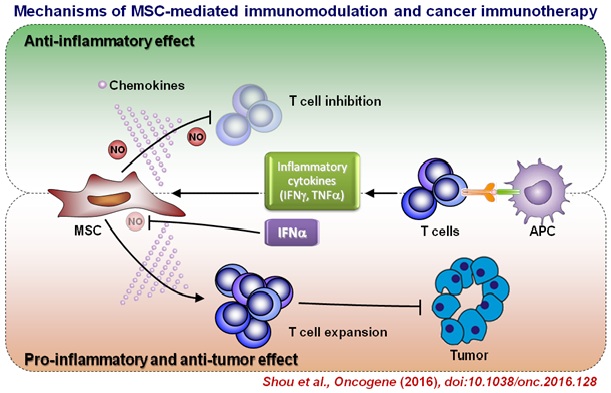
Cancer has become the leading cause of death in China and the world, accounting for more than one in every five deaths. Tumors are considered as wounds that never heal. Mesenchymal stem/stromal cells (MSCs) can migrate to the tumor microenvironment and become strongly immunosuppressive in the presence of inflammatory cytokines, such as IFNγ and TNFα. Previous reports from Prof. SHI Yufang’s laboratory at the Institute of Health Sciences (IHS), Shanghai Institutes for Biological Sciences, CAS and Shanghai Jiao Tong University School of Medicine has demonstrated that MSCs play a critical role in tumor promotion through nitric oxide (NO) and chemokine-induced recruitment of macrophages (Cell Stem Cell, 2008; Cell Stem Cell, 2012). In addition, their investigations also found that IFNα-secreting MSCs could exert potent anti-tumor effect in vivo (Oncogene, 2013).
Recently, a research team led by Prof. SHI Yufang found that, in addition to their direct inhibition on tumor growth, type I interferons (such as IFNα and IFNβ) also tuned MSCs to gain a tumor suppressive property. The tumor inhibition effect of IFNα is exerted through reversing the immunosuppressive property of MSCs. Interestingly, IFNα-primed MSCs could also effectively suppress tumor growth. Further investigation revealed that IFNα regulates the expression of inducible nitric oxide synthase (iNOS) in inflammatory cytokine-stimulated MSCs in a Stat1-dependent manner. Mechanistically, IFNα inhibits the NO production via decreasing the binding activity of Stat1 to iNOS promoter.
Overall, this study demonstrated that the anti-tumor effect of type I IFNs was achieved by downregulating the binding activity of Stat1 to the iNOS promoter and reversing the immunosuppressive property of MSCs.
These new findings provide essential information for the understanding of MSC-mediated immune regulation and for the development of better clinical strategies using IFNs and MSCs in cancer immunotherapy.
The study entitled "Type I Interferons Exert Anti-tumor Effect via Reversing Immunosuppression Mediated by Mesenchymal Stromal Cells” has been published online in Oncogene on Apr. 25, 2016 (doi:10.1038/onc.2016.128).

Shou et al. proposed mechanisms of MSC-mediated immunomodulation and cancer immunotherapy. In the tissue microenvironment, MSCs could interact with various immune cells and exert different effects depending on the type and intensity of inflammation. 1) Anti-inflammatory effect: Upon the stimulation of inflammatory cytokines (such as IFNγ and TNFα), MSCs produce various chemokines which result in the migration of T cells towards MSCs. T cell responses could be inhibited by high mount of nitric oxide (NO). 2) Pro-inflammatory and anti-tumor effect: However, in the present of type I interferons (such as IFNα), the production of NO is suppressed. Therefore, MSCs can promote the expansion of T cells, and lead to tumor inhibition. (Image by SHOU Peishun from Prof SHI Yufang’s group)

86-10-68597521 (day)
86-10-68597289 (night)

52 Sanlihe Rd., Xicheng District,
Beijing, China (100864)

